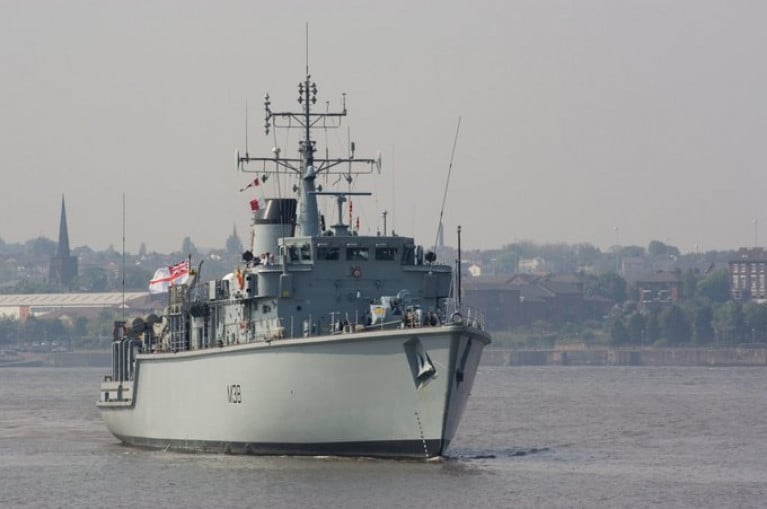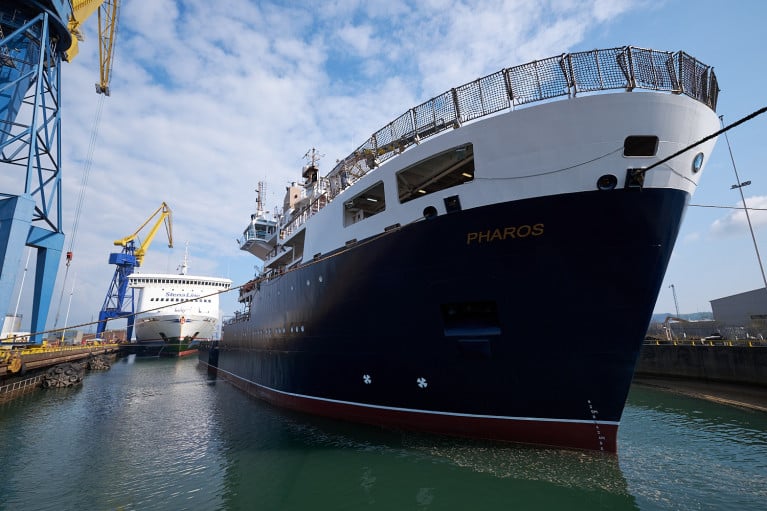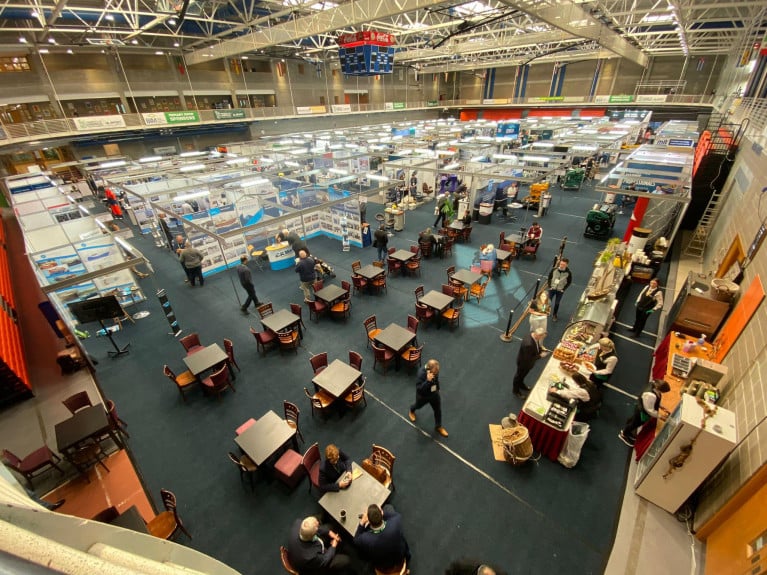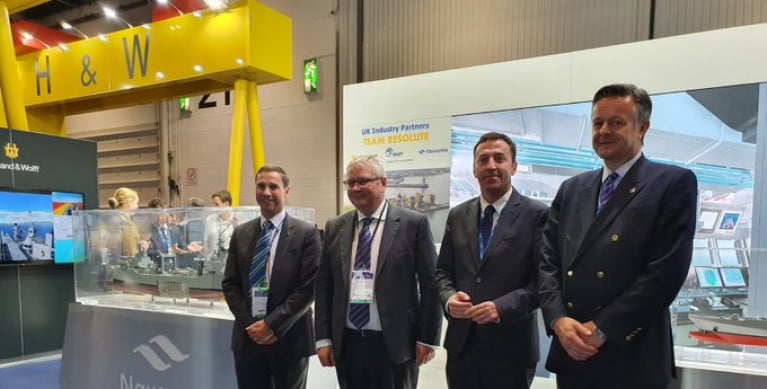Displaying items by tag: H&W
Harland & Wolff Enters Partnership with Austal, Australia to Boost Shipbuilding Business
Shipbuilder, the Harland & Wolff Group has entered a Memorandum of Understanding (MOU) with Austal, an Australian firm, to aid their pursuit of aluminium shipbuilding opportunities.
In Sydney the MOU was signed at the 2023 Indo Pacific Maritime Exposition. The MoU includes the transfer of technology, skills, and shipyard capabilities required to build the next generation of patrol vessels for the United Kingdom for maritime security agencies.
Both parties have identified opportunities in the UK market, including the Border Force vessel replacement programme, and intend to work jointly in a non-exclusive partnership on such opportunities.
Austal Limited Chief Executive Officer Paddy Gregg said the MoU was the first step towards winning new business in the United Kingdom, collaborating with Harland & Wolff, an established manufacturing, services and support company operating in the maritime defence industry.
“Harland & Wolff is an ideal partner for Austal in the pursuit of defence opportunities in the United Kingdom with the facilities, expertise and capabilities to effectively pursue and help deliver new vessels for organisations such as the UK Border Force. We look forward to collaborating with Harland Wolff on new opportunities that leverage Austal’s proven leadership in aluminium patrol boat design and construction.”
John Wood, Group Chief Executive Officer of Harland & Wolff said “I am delighted to have signed this MoU with Austal, a global leader in the aluminium vessel market. As we embark on the next phase of the Company’s growth and development, we will be partnering with Austal not only for the transfer of technology to build aluminium vessels but to also join hands with them when bidding for contracts.
He added "Austal’s skills and decades of experience in the aluminium build space and border security vessels are second to none. I look forward to working closely with them to build the next generation shipyard capability for aluminium vessels in the UK.”
Shipyards at Harland & Wolff Belfast and in Scotland Secure £8.5m Contract for Additional Barges
Shipyard firm, Harland and Wolff Group has announced a new contract from a London based waste management operator, worth £8.5m to build an additional 10 new barges for duties on the River Thames.
The company which also has a fleet of tugs, the Cory Group, last year announced contracts to fabricate 23 barges in total for the group of companies which delivers waste management services across the UK capital.
At H&W’s main shipyard in Belfast was delivered in April the first of the 23 barge order, which was the first vessel in two decades to be launched from the shipyard on Queens Island.
The barge-building programme continues to proceed apace but is not exclusively centred at the Belfast shipyard as the work is been fulfilled across the Group’s facilities which includes two sites in Scotland, Arnish on the Isle of Lewis and Methil on the Firth of Forth of Firth
So far eight of the barges have been delivered to Cory and H&W is expected to complete the entire programme by 2025.
More from Belfast Telegraph on this extended barge-contract.
The shipbuilder, Harland & Wolff Group, is to be part of this year’s London International Shipping Week (LISW23) as Afloat previously reported is to take place 11-15 September.
The London listed H&W is to be a reception sponsor for the upcoming LISW23 Parliamentary Cruise.
The cruise on the Thames will take place on the 11th September on board a City Cruises' vessel, bringing together the UK Government and industry leaders. Afloat adds the excursion vessel is the Erasmus which has a 320 seat capacity.
In addition to this sponsorship, Harland & Wolff will host an innovation focused event entitled 'Great British Green Tugs’ – How do we get there?'
The event will be on the afternoon of 13th September and will be followed by a reception hosted by H&W.
Full details of speakers and registration can be found here.
The Harland & Wolff Group which has shipyards on both sides of Irish Sea has welcomed the UK Government's announcement to launch the Shipbuilding Credit Guarantee Scheme (SCGS).
The scheme is designed to help buyers access finance to buy UK-built vessels and upgrade existing ships, with the government acting as guarantor for lenders.
The UK Department for Business and Trade claimed the scheme would create hundreds of jobs and contribute millions of pounds to the British economy based on the demand for commercial shipbuilding.
The scheme forms part of the Government’s £4 billion plan to support UK shipbuilding through the National Shipbuilding Strategy Refresh announced last year.
Welcoming the launch, John Wood, Harland & Wolff CEO, said: “We’re delighted to welcome the launch of the Shipbuilding Credit Guarantee Scheme. “The scheme will help UK shipbuilders to compete, win orders, and create new high-quality jobs across the country. We look forward to using the scheme as both a customer and builder.
“It’s a core deliverable from the National Shipbuilding Strategy, and we are committed to working with colleagues in government and across industry to accelerate its delivery so we can realise the objective of a competitive, innovative, and sustainable shipbuilding enterprise.”
Shipbuilding Tsar and Defence Secretary Ben Wallace, said: “As I set out in the National Shipbuilding Strategy Refresh, this scheme will help build confidence in UK shipyards, allowing them to invest in the people and the technology to drive productivity forward in this vital sector of the UK economy.
“Shipbuilding is hugely important to the UK, supporting 42,600 jobs nationwide and adding £2.4 billion to the economy every single year.
A strong domestic sector helps to support the wider economy’s export ambitions, with 95 percent of UK trade moved by sea".
Minister for Industry and Economic Security Nusrat Ghani, said: “Shipbuilding is an integral part of the UK’s industrial identity and through this scheme we are backing our great maritime businesses to get ahead of the competition.
“With cutting-edge vessels designed and built here in the UK this will be a boost to high-skilled careers and every company involved in the supply chain for shipbuilding, helping us to grow the economy.”
Harland and Wolff to Create 900 Jobs at Belfast Shipyard
Approximately 900 shipyard jobs at Harland & Wolff are to be created in what has been described as an "historic moment for shipbuilding in Belfast".
The shipyard located in Queen's Island was awarded the contract from the UK MoD as part of the Team Resolute consortium to deliver the Fleet Solid Support programme (FSS) of three vessels for the Royal Fleet Auxiliary.
The consortium comprises Harland and Wolff, BMT and Navantia UK.
On a visit to the shipyard, Defence Secretary Ben Wallace and Northern Ireland Secretary Chris Heaton-Harris confirmed the £1.6 billion contract which will see the FSS ships serve the requirements of the Royal Navy.
More from BelfastLive on the contract to assemble the newbuilds in Belfast following construction at H&W Appledore and Navantia's shipyard in Cadiz, Spain.
Harland & Wolff Joins in Celebrating Maritime UK Week (10-16 October)
As Afloat reported today, Maritime UK Week (10-16 October) is underway with the Belfast shipyard of the Harland & Wolff Group also joining in celebrating the maritime sector campaign.
In addition Harland & Wolff will also highlight their sites, skills, and people as part of the Martime Week's campaign to focus on the latest developments in the maritime sector and engage people across the UK with the world of maritime.
The week long event is led by Maritime UK, the umbrella body for the maritime sector, bringing together the shipping, ports, services, engineering and leisure marine industries.
Throughout the week, people are invited to explore the world of maritime through a series of careers fairs and open days, among them an 'Open Day' to be held tomorrow on the Isles of Scilly ferry.
During the week, Harland & Wolff will be hosting a first on site roundtable at their Belfast yard which is Centred on Pride in Maritime.
This industry roundtable, is to be held on 13 October (10am – 11:30am) which is to bring together leaders and network members to discuss progress on ensuring maritime is welcoming for the LGBT+ community.
In addition for more information about Maritime UK's careers events page click here.
Harland & Wolff shipyard has acquired the former UK Royal Navy HMS Atherstone from the Ministry of Defence (MOD).
HMS Atherstone was launched in 1986 as the Hunt-class Mine Counter-Measures Vessel (MCMV), that is no longer in service.
The acquisition by Harland & Wolff of the vessel is with a view to refurbishing it for non-military uses, discussions for which have already commenced with interested parties.
Harland & Wolff is involved in a competition run by the MOD regeneration programme for the former HMS Quorn (M55). It believes that the acquisition of the former
HMS Atherstone will significantly de-risk the M55 regeneration programme given that the two vessels share a number of spare parts and components.
Should Harland & Wolff be awarded the regeneration programme for the M55, such spare parts and components on the HMS Atherstone will be utilised during the regeneration programme of the M55. It expects negotiations with the MOD on the M55 regeneration programme to be completed in the next few weeks with an announcement to be made thereafter, should an award be made in Harland & Wolff’s favour.
Harland & Wolff, group CEO John Wood, commented: “I am delighted that we have acquired the former HMS Atherstone.
“The benefits of this acquisition are two-fold; we now can significantly de-risk the M55 regeneration programme by utilising spares and component parts common to the two vessels, which has been recognised by MOD and will certainly help in closing out the negotiations over the next few weeks.
“Secondly, we also can utilise this platform as the basis for other clients’ projects, which will be a valuable revenue stream for 2023.
“I am pleased that we have generated a lot of interest for the repurposing of the former HMS Atherstone, and I expect to make announcements in this regard as soon as we have executed a refurbishment contract with a counterparty.”
Work Recovering at Harland & Wolff Group's Belfast Shipyard Despite Posting Loss of £25.5m
The shipyard owner of Belfast's Harland & Wolff has said its business is improving after announcing a pre-tax loss of £25.5 million for its latest reporting period.
Infrastrata PLC, which bought the company out of administration in late 2019, officially began trading under the Harland and Wolff name last September.
The group, which is also seeking to develop gas storage caverns under Larne Lough at Islandmagee, said it is in year three of a five-year plan to make the shipyard profitable again.
But it said the war in Ukraine and the ongoing energy crisis have hit those plans.
Publishing its accounts for the 17 months ending December 31 2021, Harland and Wolff Group Holdings PLC said revenues grew to £18.5m during the period, up from £1.5m for the year to July 31 2020.
The company has now absorbed pre-tax losses of around £36m in the last two reporting periods, with losses reaching £25.5m in the latest 17 months.
It put the losses down to “significant investment to support future growth of the business”, including the acquisition of three shipyards.
Appledore in Devon was acquired in August 2020, followed by Scottish yards Methil and Arnish in February 2021. All three now bear the Harland and Wolff branding.
The Irish News reports more on the shipyard group.
As pictured above is the Northern Lighthouse Board's aids to navigation tender, NLV Pharos which Afloat reported last month.
Harland & Wolff Launch Fishing Vessel Newbuild & Marine Services at Irish Skipper Expo
Shipyard group, Harland & Wolff has launched their fishing vessel newbuild and marine services at the Irish Skipper Expo 2022 held in Limerick which continues tomorrow, Saturday, 26th March between 10am-4pm.
Displaying the capacity and capability of two world-renowned shipyards – Harland & Wolff (Belfast) and Harland & Wolff (Appledore) are to showcase the experience and expertise of their team across these both these sites.
H&W will also be premiering their own fishing vessel design for those who want a ready-package and showcasing its bespoke service offering too.
This launch comes as the UK’s new build fishing vessel capacity is in high demand and with lead times growing. H&W say they have immediate capacity to service this sector and build vessels at these shipyards.
The Irish Skipper Expo is held at the University of Limerick' Sport Arena in Castletroy. The event is Ireland’s flagship fisheries venue designed to showcase a vast array of equipment and support services available to the commercial fishing sector.
Harland & Wolff Makes Major Progress on Both Sides of the Irish Sea
Harland & Wolff, a wholly owned subsidiary of InfraStrata plc, and soon to be known as Harland & Wolff Group Holdings plc, as Afloat previously reported has announced several key successes across its yards in Belfast and Appledore.
In addition to highlighting the progression it has seen in both the UK's Fleet Solid Support Warships and National Flagship competitions.
Harland & Wolff (Belfast)
The Harland & Wolff (Belfast) team provided its first major in-service support to Virgin Voyage’s new cruiseship Scarlet Lady. The team provided the necessary support efficiently and without having to take it out of operation. This is a significant step towards providing high value add services to clients whilst ensuring vessels remain in operation – saving clients’ money by avoiding dry dockings and the need to take vessels out of service.
The yard in Belfast Harbour is bolstering its global reputation as a large vessel ready facility that is open for business. Currently home to the P&O's Azura, the largest cruiseship to have entered the yard thus far.
At the facilities quayside of the Repair Dock, is also set to welcome Dorset Spirit, a crude oil tanker measuring over 279 meters in length. Sailing from Canada to Harland & Wolff for repair works, this is the first time since the acquisition of the assets in 2019 that a vessel of this size will enter the yard's Building Dock.
Harland & Wolff (Appledore)
At Harland & Wolff (Appledore), the company's facility in north Devon, England, awaits the arrival of MT Entsha, an offshore supply ship, which is expected to arrive during the third week of October. Fabrication work has already commenced on a major crane upgrade and mezzanine deck as part of its wider conversion works that will be undertaken once the vessel has docked. This project effectively reactivates Harland & Wolff (Appledore)’s fabrication halls and demonstrates its readiness to take on larger and more complex works programmes.
Team Resolute
As reported in the press, Team Resolute has been down-selected by the Ministry of Defence for the Fleet Solid Support Programme and has been invited into the next phase of the programme – the Commercial Procurement Phase (CPP). Harland & Wolff is an integral part of Team Resolute and will be participating in the first stage, the design stage, within the CPP, alongside BMT and Navantia.
National Flagship
As the UK Government launched the National Shipbuilding Office earlier this week, an announcement was made that the Harland & Wolff led consortium that includes Foreship and SMC has been successfully down-selected for the design phase of the prestigious National Flagship Programme. The ship will be built in the UK with construction expected to begin as soon as next year.
John Wood, Group CEO of commented: “It is fantastic to see multiple contracts being awarded to Harland & Wolff across Belfast and Appledore. These range from minor “bread & butter” type of works to major contracts that have the capacity to grow even more in value over time. We are now being recognised as a shipyard business that is professional, cost effective and customer attentive. This recognition is clearly demonstrated by a series of new client wins and repeat business from our existing clients. Looking ahead, I believe that we have laid the firm foundations for rapid growth and the build-up of a contractual pipeline for 2022 and beyond.”
































































